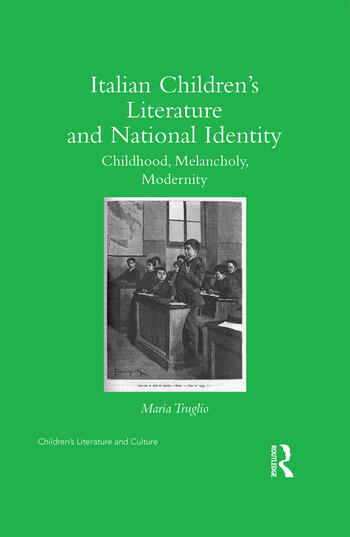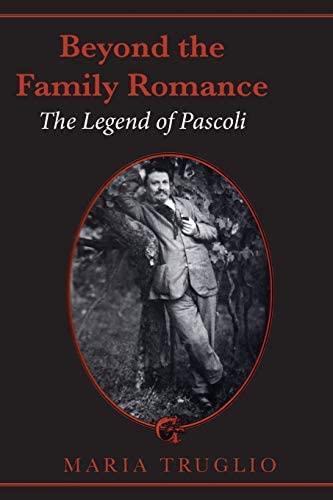152 Burrowes
Curriculum Vitae:

Biography:
Maria Truglio is a Professor of Italian and Women’s, Gender & Sexuality Studies. She earned her BA from Wesleyan University in 1992, and her MA (1996) and PhD (2001) from Yale University. Dr. Truglio’s research interests include 19th- and 20th- century Italian literature, children’s literature, and critical methodologies, especially psychoanalysis, semiotics, and post-structuralism.
In her book, Beyond the Family Romance: The Legend of Pascoli (University of Toronto Press, 2007), she offers a psychoanalytic perspective of the work of Giovanni Pascoli (1855-1912), one of Italy’s most celebrated and innovative poets, with a particular focus on the uncanny. In her study, she examines how Pascoli and Freud interrogate the question of “origins,” manifested in such images as the maternal, the Golden Age, and childhood, and investigates the literature of the Scapigliatura as a precursor to Pascoli’s uncanny poetry.
In addition to her work on Pascoli and on Italian gothic writers, Dr. Truglio has published articles on Primo Levi’s Se questo è un uomo, Melania Mazzucco’s Vita, and on the children’s books of Annie Vivanti, Dino Buzzati, Umberto Eco and Eugenio Carmi, Eugenio Cherubini, Francesco D’Adamo, as well as on the representation of Giuseppe Garibaldi in children’s books before the First World War. This research has been published in journals such as Forum Italicum, Quaderni d’italianistica, Romanic Review, MLN: Modern Language Notes, California Italian Studies, Italian Quarterly, Children’s Literature Association Quarterly, and Children’s Literature. She has contributed an essay to the MLA’s volume on Teaching Pinocchio. Her book project, Italian Children’s Literature and National Identity: Childhood, Melancholy, Modernity was published by Routledge’s Children’s Literature and Culture Series in 2017. The book explores children’s literature in Italy from the unification period though the rise fascism. This research has received funding from the Children’s Literature Association and from Penn State’s Institute for the Arts and Humanities. Her current project examines how contemporary books for children in Italy represent migration, and has recevied support from the Children’s Literature Association and Penn State’s Centre for Global Studies.
With Dr. Nicolás Fernández-Medina, she co-founded the Spanish and Italian Modernist Studies Forum at Penn State. She and Dr. Fernández-Medina co-edited the volume Modernism and the Avant-garde Body in Spain and Italy (Routledge, 2016), to which she also contributed a chapter on Massimo Bontempelli’s magical realist children’s book. Currently, Dr. Truglio is participating in an oral history project funded by the CHI entitled Centre County’s History Otherwise: Narrating and Mapping Brazilian, Hispanic, and Italian Women’s Stories led by Dr. Judith Sierra-Rivera. She also serves on the International Committee of the Children’s Literature Association. She also serves on the International Committee of the Children’s Literature Association, and has been collaborating with colleagues in Chili and Philadelphia on projects concerning children’s literature and national identities, such as this webinar held in 2023.
Dr. Truglio teaches a range of courses that include topics such as Romanticism in Italy, Women Writers, Italian American culture, Italian theater, advanced language development, and turn-of-the-century literature. She received a “bridging the classroom” grant from the IAH (now the HI) for a collaboration between her undergraduate seminar on children’s literature and an advanced sculpture class. The semester culminated in a public exhibit of the texts and sculptures at the Down Town Theater. Dr. Truglio received an Outstanding Teaching Award from the College of the Liberal Arts in 2010, and the Malvin E. and Lea P. Bank Outstanding Teaching Award from the College in 2014. In 2020-2022 she served as faculty coordinator for Penn State’s Redesigning Modernities project which produced a range of syllabi and OER material.
- A conversation with Elena Borelli about the poem “Anticlos” from Giovanni Pascoli’s Poemi conviviali: https://www.poemiconviviali.com/
- A discussion of the new Disney+ Pinocchio film as a post to the Children’s Literature Association International Committee blog: https://childlitassn.wixsite.com/intlcommittee/single-post/disneys-zany-pinocchio
- A conversation about the reception of Gianni Rodari in the U.S. on Radio Citta’ Fujiko (Bologna, Italy): https://www.radiocittafujiko.it/gianni-rodari-nel-mondo-usa-ed-india/
- A review of The Shadow King by Maaza Mengiste on WPSU’s “Bookmark”: https://radio.wpsu.org/history-and-culture/2021-02-04/bookmark-the-shadow-king-by-maaza-mengiste
Pronouns
- she / her / hers / (lei)
Publications

Italian Children’s Literature and National Identity: Childhood, Melancholy, Modernity
- Author(s): Maria Truglio
This book bridges the fields of Children’s Literature and Italian Studies by examining how turn-of-the-century children’s books forged a unified national identity for the new Italian State. Through contextualized close readings of a wide range of texts, Truglio shows how the 19th-century concept of recapitulation, which held that ontogeny (the individual’s development) repeats phylogeny (the evolution of the species), underlies the strategies of this corpus. Italian fairy tales, novels, poems, and short stories imply that the personal development of the child corresponds to and hence naturalizes the modernizing development of the nation. In the context of Italy’s uneven and ambivalent modernization, these narrative trajectories are enabled by a developmental melancholia. Using a psychoanalytic lens, and in dialogue with recent Anglophone Children’s Literature criticism, this study proposes that national identity was constructed via a process of renouncing and incorporating paternal and maternal figures, rendered as compulsory steps into maturity and modernity. With chapters on the heroic figure of Garibaldi, the Orientalized depiction of the South, and the role of girls in formation narratives, this book discloses how melancholic itineraries produced gendered national subjects. This study engages both well-known Italian texts, such as Collodi’s The Adventures of Pinocchio and De Amicis’ Heart, and books that have fallen into obscurity by authors such as Baccini, Treves, Gianelli, and Nuccio. Its approach and corpus shed light on questions being examined by Italianists, Children’s Literature scholars, and social and cultural historians with an interest in national identity formation.

Modernism and the Avant-garde Body in Spain and Italy
- Author(s): Nicolás Fernández-Medina, Maria Truglio
This interdisciplinary volume interrogates bodily thinking in avant-garde texts from Spain and Italy during the early twentieth century and their relevance to larger modernist preoccupations with corporeality. It examines the innovative ways Spanish and Italian avant-gardists explored the body as a locus for various aesthetic and sociopolitical considerations and practices. In reimagining the nexus points where the embodied self and world intersect, the texts surveyed in this book not only shed light on issues such as authority, desire, fetishism, gender, patriarchy, politics, religion, sexuality, subjectivity, violence, and war during a period of unprecedented change, but also explore the complexities of aesthetic and epistemic rupture (and continuity) within Spanish and Italian modernisms. Building on contemporary scholarship in Modernist Studies and avant-garde criticism, this volume brings to light numerous cross-cultural touch points between Spain and Italy, and challenges the center/periphery frameworks of European cultural modernism. In linking disciplines, genres, —isms, and geographical spheres, the book provides new lenses through which to explore the narratives of modernist corporeality. Each contribution centers around the question of the body as it was actively being debated through the medium of poetic, literary, and artistic exchange, exploring the body in its materiality and form, in its sociopolitical representation, relation to Self, cultural formation, spatiality, desires, objectification, commercialization, and aesthetic functions. This comparative approach to Spanish and Italian avant-gardism offers readers an expanded view of the intersections of body and text, broadening the conversation in the larger fields of cultural modernism, European Avant-garde Studies, and Comparative Literature.

Beyond the Family Romance: The Legend of Pascoli
- Author(s): Maria Truglio
- Publication Date: 2007
- Website: https://utorontopress.com/9780802091918/beyond-the-family-romance/
Giovanni Pascoli (1855-1912) is one of Italy’s most canonical and beloved poets. In Beyond the Family Romance, Maria Truglio offers fresh insight into the uncanny qualities of Pascoli’s domestic verse. As suggested by the Freudian title, this study opens a dialogue between Pascoli’s literature and Freud’s theories, with a particular focus on each author’s interrogation of origins. Through close readings and historical contextualization, themes of regression, memory, and other manifestations of ‘origins’ are analyzed, moving Pascoli’s poetry beyond the biographical strictures that have hitherto confined it. Truglio’s post-structuralist readings question the dichotomy between ‘safety within the home’ and the ‘threatening outside world,’ revealing the ambivalences with which images of the home are fraught in Pascoli’s poetry. In addition to the sustained comparison with Freud’s writing, Beyond the Family Romance explores parallels between Pascoli’s work and such writers as Tarchetti, Boito, Poe, and Invernizio. Rethinking the concept of the fanciullino (‘little child’), Truglio shows that Pascoli’s poetry enacts a symbiosis between the logic of the rational modern adult and the mythic vision of the child.